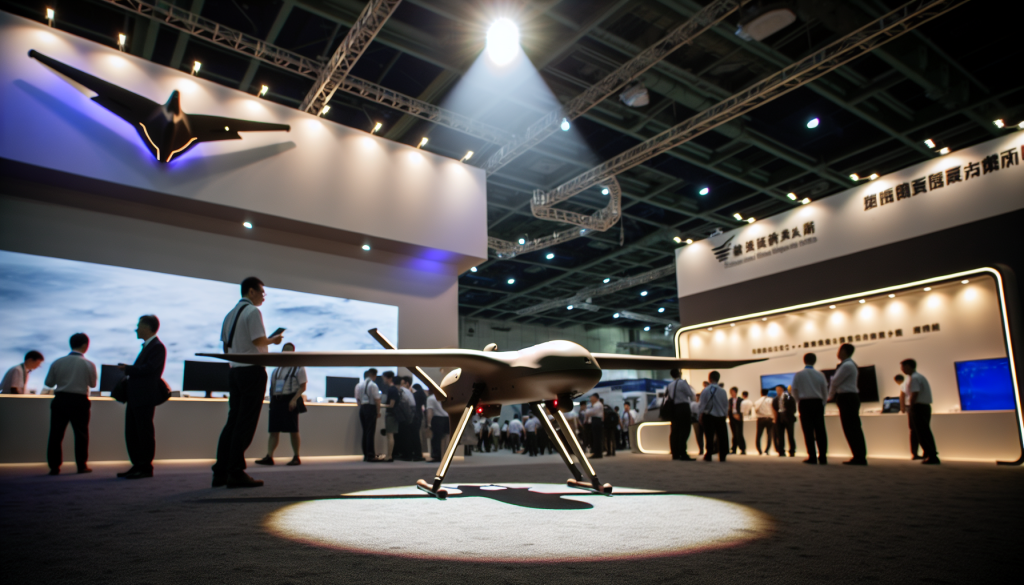Taipei Aerospace & Defense Technology Exhibition: A Showcase of Innovation and Strategy
The Taipei Aerospace & Defense Technology Exhibition (TADTE) celebrated its grand opening on September 18, marking a significant event for the global military technology community. With cutting-edge unmanned vehicle displays from international manufacturers, this year’s exhibition underscores the increasing integration of advanced technology in military operations, particularly in the realm of drone warfare.
Collaboration between Local and International Manufacturers
One of the highlights of TADTE was the partnership between Apex Aviation, a local manufacturer, and TEKEVER, a European leader in AI drone innovation. Together, they introduced the AR3 drone, which previously served in the Ukraine conflict before making its debut in Taiwan’s defense landscape. This collaboration illustrates a growing tendency toward international partnerships in defense, blending local expertise with advanced foreign technologies.
Enhancing Maritime Security with Integrated Systems
Wilson Kao, chairman of Apex Aviation, placed significant emphasis on the need to integrate both manned and unmanned aircraft to bolster maritime security. He articulated that efficiency in technical integration stems from comprehensive combat experience among partners. This holistic approach aims to ensure that aerial operations are as seamless as possible, enhancing Taiwan’s defensive capabilities.
Wu Hsiu-lien, the founding chairman of the Taiwan Drone Association, highlighted two significant trends shaping the current landscape: the miniaturization of reconnaissance drones and the evolution of larger strategic drones. These trends suggest a shift toward more versatile drone applications, which can adapt to a range of military scenarios.
The Need for Specialized Training
As Taiwan invests in sophisticated drone systems, there’s a pressing need for intensified professional training. The operational requirements for large drones, which often come equipped with small aircraft engines, demand that ground operators possess aviation knowledge akin to that of pilots. This necessity reflects the complexity of modern combat scenarios where skill and expertise become critical for effective unmanned systems deployment.
Apex Aviation’s training programs will focus on equipping operators with the technical proficiency needed for managing these advanced technologies, ensuring that Taiwan’s military personnel are well-prepared to utilize new assets effectively.
Upcoming Drone Acquisitions to Strengthen Surveillance
In a move to enhance surveillance capabilities, Taiwan’s military is set to receive several medium to large drones within the next two years. This fleet will include domestically produced models such as the Albatross II and MU-1812, as well as the U.S. MQ-9 series aircraft. These acquisitions are not merely transactional; they signify a paradigm shift in Taiwan’s military modernization efforts and represent a substantial commitment to enhancing defense technology.
Moreover, Taiwan’s Ministry of National Defence has announced a monumental plan to procure at least 48,750 drones within the next two years, with a significant focus on small reconnaissance types. These ambitious procurement efforts are aimed at remedying the current insufficiency of Taiwan’s drone fleet against an ever-growing Chinese military presence.
Strategic Defense Planning Amidst Regional Threats
Adm. Samuel Paparo, of the U.S. Indo-Pacific Command, added another dimension to the discourse on Taiwan’s military strategy. He suggested that deploying extensive drone fleets in the Taiwan Strait could create a significant defensive barrier, allowing allied forces crucial time to mobilize in the event of a potential Chinese attack. His vision of transforming the Taiwan Strait into an “unmanned hellscape” highlights the strategic importance of drones in contemporary warfare.
The Technological Advantage of Taiwan
Taiwan’s unique position in the global semiconductor supply chain and high-tech development sector empowers it to advance its defense capabilities substantially. These technological advantages, coupled with international military industry collaborations, bolster Taiwan’s asymmetric warfare strategy. By leveraging both domestic expertise and foreign partnerships, Taiwan aims to fortify its military posture against emerging regional threats, positioning itself as a formidable player in the defense landscape.
In summary, TADTE serves as a timely reminder of the ongoing evolution in military technology and strategy. Taiwan’s commitment to enhancing its defense capabilities through innovative drone technology and strategic partnerships underscores a critical moment in regional security dynamics.

